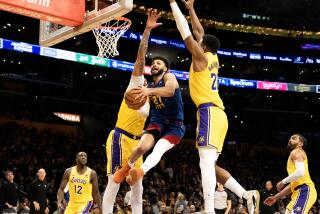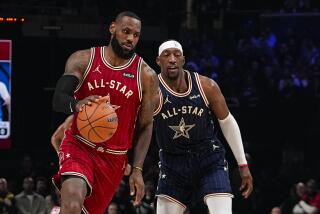COMMENTARY : For Athletes, Sometimes the Risk Is Too Great
The Boston Celtics are getting ready for the playoffs, and Kevin McHale’s foot aches. It always aches. He broke it four years ago at the end of the regular season, then played in the playoffs although his foot hadn’t healed and he was risking his career.
The Celtics were bidding for the championship in 1987 and having McHale on one foot was better than most players on two. McHale was limping so noticeably that the competitor of competitors, Larry Bird -- as yet untouched by major surgery -- suggested it probably would be better for McHale to go home and rest, even if it undermined the Celtics’ quest.
But McHale didn’t go home. He wanted to win a championship. And he didn’t want the Celtics to think he wasn’t willing to pay the price.
McHale played on. He has lived to regret it. He says if he could do it again, he never would. People called it courage. McHale calls it stupid. He is only 33 years old, and he is still one of the NBA’s better players, but his foot will never be the same.
Too bad McHale didn’t have a talk with Bobby Carpenter. Not that Carpenter would have listened.
On the eve of their Adams Division final against the Montreal Canadiens, the Boston Bruins announced that Carpenter is out for the season. They also announced he needs surgery immediately on his fractured left kneecap.
Is this a new story or an old story? Both. Carpenter shattered his kneecap like a vase dropped from a 12th-floor window when he crashed against the boards in Montreal Dec. 8. He had surgery Dec. 11. The Bruins said he wouldn’t play the rest of the season. Doctors wondered if he’d play for the rest of his life.
They were both wrong. Doctors hooked Carpenter’s knee to a machine that kept his leg moving 23 hours a day. In March, with five screws and about eight miles of wire and tape holding his shattered kneecap in place, Carpenter resumed skating.
On April 5, despite his and Coach Mike Milbury’s adamant denials -- which included ridiculing the media for suggesting he might be on the verge of a comeback -- Carpenter played in Game 2 against the Hartford Whalers. Even more amazing, he played well. Although he noticeably favored his bad leg, he took his regular shift and assisted on the winning goal. It was a minor miracle.
Or was it a terrible mistake? Carpenter didn’t play the rest of the series, and the Bruins said it was because a Whalers stick injured his wrist. Now they say he can’t play because he refractured his kneecap and needs another operation. One option, according to the Bruins, is a bone graft, moving a piece of bone from his hip to his knee. Another is to have surgery like the last one.
The third option was not to play until his knee was 100 percent, or as close to 100 percent as it would be for the rest of his life.
Bobby Carpenter, the hometown hero from Peabody, Mass., did not take that option. The Bruins were down 1-0 to the Whalers and desperately needed a victory in Game 2 at Boston Garden, lest they face a 2-0 deficit when the series shifted to the Hartford Civic Center for Games 3 and 4. That would have been a deep hole. Carpenter had medical clearance to play. Why not try?
When it comes to sports injuries, the decision to play or not to play is almost always left to the athlete. McHale says the decision to keep playing with his injured foot was entirely his. And if he didn’t play, the guilt was entirely his.
If you know you should help a person in need, but you don’t, you feel guilty. Guilt is a useless emotion. It doesn’t help anybody.
But it helps your team, in the short run. Because guilt is that part of what drives the McHales and the Carpenters and the hundreds like them to play when their body is begging them not to. Guilt is part of what makes them risk their careers so they can help the team, so they will be respected by their peers and organization, admired by their fans.
If you had a dollar for every athlete who’d been falsely accused of being a malingerer, you’d be as rich as Roger Clemens. Remember Astros pitcher J.R. Richard? He was 6 foot 7 and had a hellacious fastball. When he complained of feeling weakness in his arm and doctors couldn’t find anything wrong, fans, people in the Astros organization and some media members suggested J.R. was a malingerer. Soon after, he suffered a stroke that left him partially paralyzed and ended his career. Turns out J.R. was right, but that’s a heckuva way to prove people wrong.
Medical care is more sophisticated and modern-day coaches can be more understanding, but salaries are astronomical, and so is the pressure on athletes to perform. For the typical team sport athlete, the need to prove his toughness and his courage to his teammates -- and to himself -- is essential.
So is the desire to be out there, playing, no matter what the cost down the road. It’s not just guilt that drives the McHales to play with broken feet, the Carpenters to play with shattered kneecaps. It’s certainly not guilt that drove Paul Coffey to play Game 7 of the Penguins-Devils series, risking blindness in one eye. It’s wanting to help the team win -- now -- and worrying about tomorrow when it comes.
As you might expect, Milbury lauded Carpenter for showing “a ton of courage” by playing Game 2. You could argue Carpenter would have shown more courage by refusing to play in Game 2, or any other playoff game.
Ultimately, maybe it doesn’t have much to do with courage. Maybe it’s just that when the show goes on, the athlete, like any performer, doesn’t want it to go on without him. Maybe the reality of not playing kills him more than the fear of what will happen down the road if he does.
McHale regrets his choice. Will Carpenter?
More to Read
Go beyond the scoreboard
Get the latest on L.A.'s teams in the daily Sports Report newsletter.
You may occasionally receive promotional content from the Los Angeles Times.










